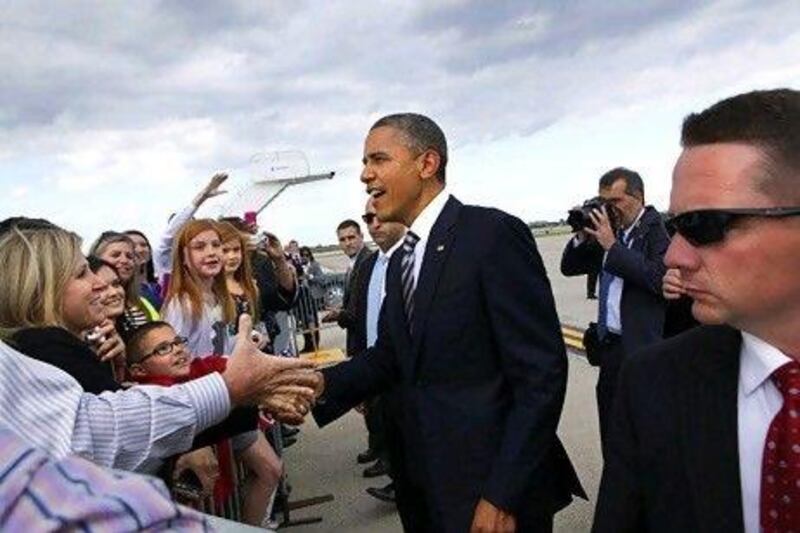WASHINGTON // With the Republicans finally decided on their candidate, the US presidential race can begin in earnest five months ahead of the November 6 vote. But Barack Obama, the incumbent, is facing a very different campaign than when a promise of hope and change swept all before him four years ago.
In 2008, eight years of war, terrorism fears and financial mismanagement had left Americans looking for something different. Now, four years of battling a recession that will not quite loosen its grip on the country and with continued conflict overseas, Mr Obama is facing the difficult task of persuading voters they should continue with more of the same.
It will be a challenge, said Steve McMahon, a Democratic strategist and a media consultant to the former Democratic presidential hopeful, Howard Dean.
"It's a lot more difficult being the president than it is to run a campaign on hope and change."
So far, Mr Obama has defended his record while presenting an above-the-fray demeanour. He has poked fun at the more outrageous claims of his political adversaries - such as former presidential hopeful Donald Trump's continued insistence that Mr Obama was not born in America - but he has not stooped to their level.
On Wednesday he called Mitt Romney, the former Massachusetts governor, to congratulate him on clinching the Republican nomination and called for a "healthy debate" about America's future.
At the same time, however, his campaign team has gone on the attack, questioning Mr Romney's job-creation record as a venture capitalist, and painting the multimillionaire as a member of the overprivileged super-rich 1 per cent, not the ordinary 99 per cent to which the president belongs.
Mr Obama's campaign is also touting his foreign-policy credentials. He withdrew, as promised, US forces from Iraq; is winding down the Afghanistan war, a conflict that is now deeply unpopular with Americans; and he authorised the operation that led to the killing of Osama bin Laden.
His campaign tried to address any lingering doubts over the president's "toughness" with a couple of strategic leaks in recent days. Mr Obama is micromanaging America's war against Al Qaeda, personally approving names on a "kill list". He also approved the acceleration of cyber attacks against Iran's nuclear installations immediately after becoming president, according to report in The Washington Post.
Unusually for a Democrat, said Mr McMahon, Mr Obama goes into the election with an advantage over Republicans on foreign policy. Mr Romney's foreign-policy credentials have not been tested. Mr McMahon said: "This president has bragging rights."
It is the economy that will dominate the campaign, however, and here Mr Obama is vulnerable. Sluggish economic growth has failed to lower an unemployment rate that is dangerous to an incumbent. The US added only 69,000 jobs in May. The unemployment rate rose to 8.2 per cent from 8.1 per cent in April.
On Friday, Mr Romney seized on the statistics, calling Mr Obama's record while in office "a cascade of one bad piece of economic news after another".
Yet even with those modest job additions, Mr Obama can correctly argue that since he took office he has added jobs to the private sector. On the economy, his argument to voters is simple - the leaks have been plugged and the ship is turning in the right direction.
But it is not turning quickly, and some blame a lack of leadership.
Critics point out that Mr Obama could not secure cross-party consensus on health-care reform when Democrats controlled the Congress. He did not obtain a budget compromise after Republicans took over.
His administration is "letting him down", said Lori Handrahan, a professor with the School of International Service at American University in Washington, DC.
The failure to quickly address problems in his own government - ranging from the vote of no-confidence by 7,000 Immigration and Customs Enforcement employees in their boss, an Obama appointee, to his lack of action over Secret Service agents revealed to have solicited prostitutes ahead of a state visit to Colombia in April - shows an unwillingness to face up to and correct mistakes, she said.
"The more the administration says there is no problem, the more people will say there is no leadership."
A lifelong Democrat, Ms Handrahan, who ran for Congress for the party in her native Maine, this year registered as an independent voter for the first time. It was an "emotional moment", she said, but she had lost faith in the party.
She said: "Among liberals, where's the hope? We had a lot of hope, but very little has changed."
Mr McMahon acknowledged that Mr Obama has a battle on his hands to energise the liberal, mostly youthful base that swept him to power in 2008. The president, he said, needed to find a positive message, an "aspirational view of America's future", that would remind voters why they liked him in the first place.
"He may be able to win this election by simply beating down Mitt Romney, and he may have to, but it would be better if he could win it the way he won it in 2008."
Nevertheless, he said, if Mr Obama suffers an enthusiasm problem, at least a majority of voters like him, unlike Mr Romney.
Mr Romney rarely gets more than the high-30s in personal approval polling. Mr Obama has generally scored above 50.






